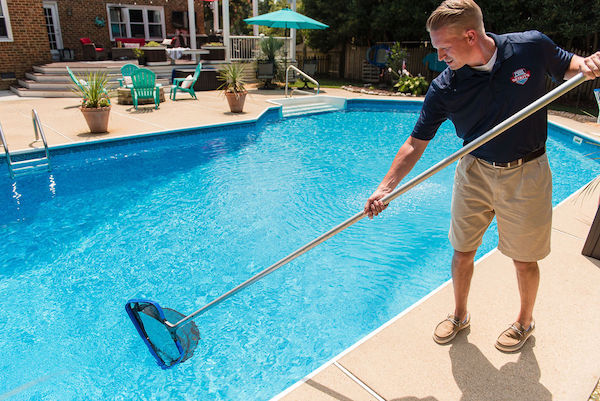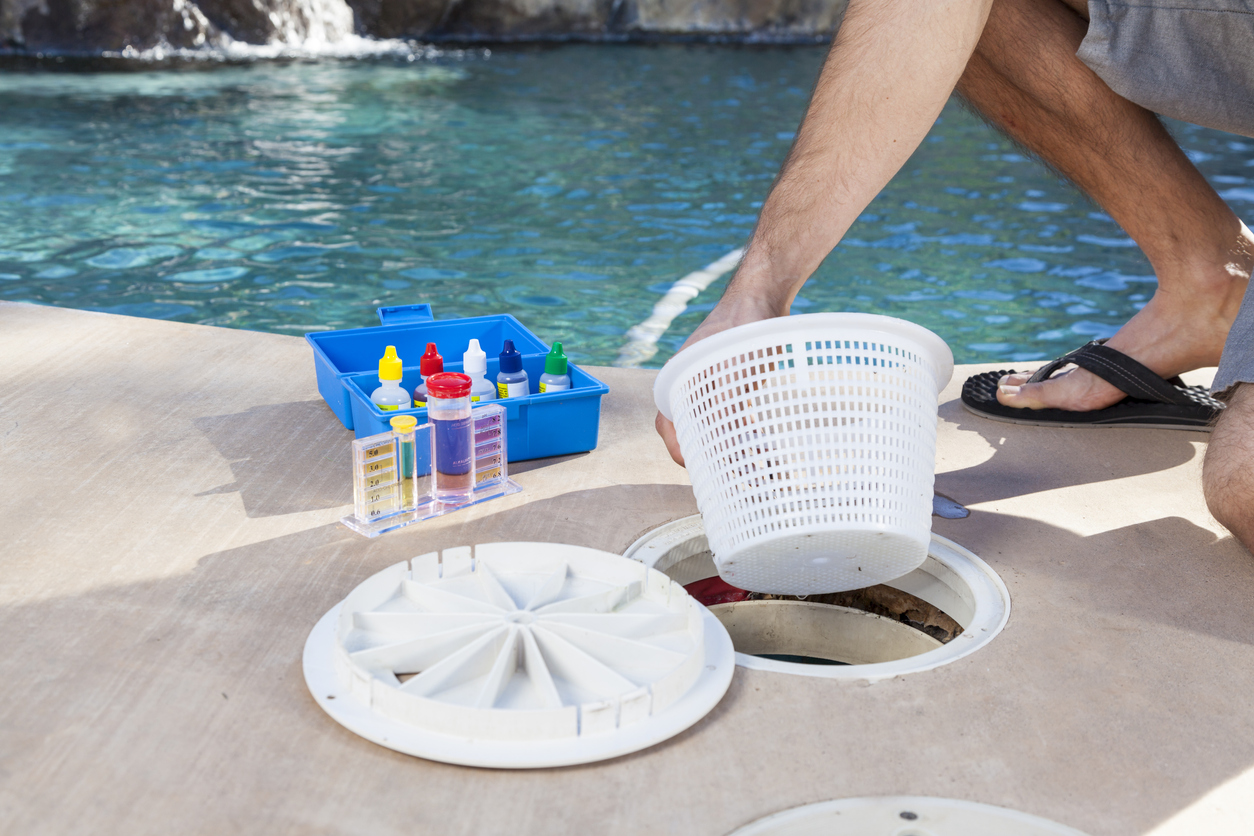Essential Pool Maintenance Tips to Maintain Your Water Sparkling Clean
Maintaining a pristine swimming pool calls for a methodical technique to water treatment and cleanliness, which eventually adds to both the aesthetic appeal and durability of the pool itself. Trick practices include regular testing of water chemistry, efficient purification, and particles monitoring. Sticking to these basic methods not only improves the quality of your swimming pool water yet additionally safeguards versus possible concerns that can intensify into expensive repair services. As we check out these essential upkeep pointers, a much deeper understanding of their relevance will reveal just how simple activities can lead to amazing results in swimming pool maintenance.
Examination Water Chemistry Regularly
To make sure a pleasurable and safe swimming experience, frequently testing water chemistry is crucial. Appropriate water equilibrium not only improves swimmer convenience yet also protects pool tools and surfaces. The key chemical specifications to monitor consist of pH, chlorine levels, alkalinity, and calcium solidity.
pH degrees ought to be maintained between 7.2 and 7.8, as this variety decreases skin and eye irritability while enhancing chlorine effectiveness. Chlorine degrees must ideally be between 1-3 parts per million (ppm) to supply appropriate sanitation without creating unpleasant smells or irritation. Total alkalinity, which serves as a barrier for pH, should be maintained in between 80-120 ppm to stabilize water chemistry and avoid fluctuations.

Keep the Swimming Pool Filter Clean
Preserving proper water chemistry is only component of efficient pool treatment; keeping the swimming pool filter tidy is similarly crucial for optimal performance. The pool filter plays an essential role in eliminating debris, dust, and contaminants from the water, ensuring a delightful and safe swimming environment. Gradually, filters can end up being clogged with bits, which can significantly lower their efficiency.

Furthermore, keep track of the pressure gauge on your filter system. A stress rise of 8-10 psi over the normal operating range typically shows that it's time for cleansing. Disregarding to maintain a tidy filter can bring about bad water flow, unbalanced chemistry, and increased strain on the pool pump, inevitably leading to higher power expenses and potential devices failure.
Skim and Brush Often

Cleaning the swimming pool walls and floor is just as critical. It aids eliminate algae, dirt, and various other impurities that may hold on to surface areas. This task ought to be done at the very least once a week, concentrating on areas with inadequate flow, such as corners and actions - Pool Inspection. Make use of a swimming pool brush with an ideal bristle kind for your swimming pool surface-- nylon brushes for vinyl or fiberglass pools, and stainless-steel for plaster or ceramic tile surface areas.
Maintain Proper Water Levels
Keeping the swimming pool surface area tidy with constant skimming and brushing significantly adds to overall water top quality, yet maintaining proper water degrees is just as crucial for ideal pool wellness. The water degree in your swimming pool must ideally go to the navel of the skimmer opening. This makes sure that your skimmer can successfully eliminate debris and drifting pollutants, avoiding build-up that can endanger water clearness and high quality.
Reduced water levels can result in pump damages, as the pump might run dry, taking the chance of pricey repair services. Alternatively, exceedingly high water degrees can create water to overflow, weakening chemical equilibriums and developing an unattractive mess. Frequently check your swimming pool's water level, especially after hefty rainfall or significant dissipation as a result of warm.
Furthermore, consider elements such as swimming pool use, environmental problems, and the sort of water functions in your swimming pool, as these can influence water degrees. Setting up a pool cover can help minimize evaporation and keep a stable degree if you discover on your own constantly fighting fluctuating water degrees. Ultimately, routine tracking and change of water degrees will help make sure a healthy and balanced swimming setting and prolong the life of your pool devices.
Schedule Seasonal Maintenance
Understanding the relevance of seasonal upkeep is important for guaranteeing your swimming pool continues to be in ideal problem year-round. Each season brings distinct difficulties and problems that can impact the water high quality and architectural integrity of your pool. By scheduling maintenance jobs consistently, you can avoid minor issues from escalating into costly repair services.
In the springtime, focus on opening the swimming pool, examining the filtering system, and stabilizing the chemical degrees. This establishes a strong structure for the swimming period - Pool Inspection. As summer approaches, routine maintenance such as skimming particles, brushing surface areas, and monitoring water degrees ends up being important to keep tidiness and security
As loss arrives, prepare for cooler temperature levels by eliminating fallen leaves and debris, and take into consideration winterizing your pool if it will not be utilized during the cooler months. This consists of lowering water levels and including winterizing chemicals to protect versus cold.
Throughout the winter months, periodic checks on the pool cover and tools are essential to make sure whatever continues to be intact. By adhering to a seasonal upkeep timetable, you can prolong the life of your swimming pool and maintain it inviting and secure for use year-round.
Final Thought
Routine pool maintenance is important for making sure water clarity and safety. By regularly examining water chemistry, keeping the pool filter in ideal condition, and performing routine skimming and cleaning, swimming pool proprietors can successfully prevent algae development and other concerns. Maintaining appropriate water degrees improves circulation, while sticking to a seasonal maintenance schedule helps resolve potential problems proactively. Implementing these important methods will certainly contribute dramatically to a clean and inviting swimming setting.
By keeping correct water chemistry, pool owners Pool Inspection can ensure a safe environment, lengthen tools life, and boost general satisfaction of their swimming pool.
Keeping proper water chemistry is only part of effective swimming pool care; maintaining the pool filter tidy is equally vital for optimal performance. Use a pool brush with a suitable bristle type for your pool surface-- nylon brushes for vinyl or fiberglass pools, and stainless steel for plaster or ceramic tile surfaces.
Keeping the pool surface area tidy via constant skimming and cleaning significantly adds to general water quality, yet preserving correct water degrees is equally essential for ideal pool wellness.In addition, consider aspects such as swimming pool usage, environmental conditions, and the kind of water attributes in your pool, as these can influence water degrees.
 Mason Gamble Then & Now!
Mason Gamble Then & Now! Brooke Shields Then & Now!
Brooke Shields Then & Now! Atticus Shaffer Then & Now!
Atticus Shaffer Then & Now! Barbara Eden Then & Now!
Barbara Eden Then & Now! Megyn Kelly Then & Now!
Megyn Kelly Then & Now!